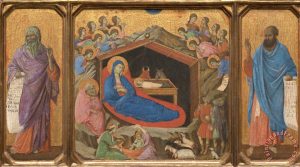Illuminations on the Lectionary readings for Dec. 18, 2022 (Advent 4A)
First Reading: Isaiah 7:10-16
As we have gone through the four weeks of Advent, we have had the opportunity to deepen our appreciation for Scripture’s account of the coming of the Messiah, which Christians understand as the Incarnation, God becoming fully human and fully divine in Jesus.

The Nativity with the Prophets Isaiah and Ezekiel (1308-1311) tempera on single poplar panel by Duccio di Buoninsegna. Andrew W. Mellon Collection, National Gallery of Art, Washington, D.C. (Click image to enlarge.)
Our first reading draws again from the prophet Isaiah, who understood the Messiah as a good king, a successor in the line of King David. Isaiah was speaking of his own time when he warned King Ahaz – an evil leader who had collaborated with the Assyrians – that as soon as the child was weaned (“eating curds and honey”), the king’s land would be conquered. Christians would later look back and interpret the birth story of Jesus in Isaiah’s prophecy that a child named Immanuel (“God with us”) would be born to a “young woman.” That Hebrew word, “almah,” would be translated in the Pentateuch, the Greek Old Testament that was in common use in the time of the Evangelists, as “parthenos,” meaning “virgin.”
Psalm: Psalm 80:1-7, 16-18
In this psalm of lament over the destruction of the temple and the people’s exile, the Psalmist begs to be spared the divine anger that has left the people with “bowls of tears to drink” as their enemies laugh them to scorn. These verses echo the Isaiah reading in the hope that God will free the people and come with power to restore the kingdom and the Covenant. Send a man of God’s right hand, the strong son of man, the Psalmist pleads, promising that the people will never again turn from God’s way if only God will save them.
Second Reading: Romans 1:1-7
The opening verses of Paul’s letters follow formal patterns set in Greco-Roman culture, much like the “To whom it may concern, I hope this letter finds you well” that we might see in modern formal correspondence. Still, even these formulaic verses tell of Paul’s pastoral concerns for the Romans. Paul emphasizes that he is an apostle of Jesus, and that Jesus is the son of God, the descendant of David prophesied in Scripture – such as the Isaiah verses we read today. Paul assures Rome’s Christians that he comes in Jesus’s name to the Gentiles, who are God’s beloved, called to be saints.
Gospel: Matthew 1:18-25
It is the fourth and last Sunday of Advent, and our Gospel takes a decided turn toward Christmas as we hear of an angel visiting Joseph, who is described as Mary’s husband, at a critical moment. Imagine Joseph, a man of an ancient, patriarchal culture, discovering that his sweet young fiancee is pregnant, but not with his child! Who wouldn’t decide to call the whole thing off? But Joseph, a righteous man, prefers to end the engagement quietly, without scandal or gossip. But then, before things go off the rails, an angel arrives to assure Joseph that Mary is bearing a child of the Holy Spirit, a son who will save his people from their sins. Finally the angel repeats Isaiah’s prophecy, quoting the Greek Pentateuch: “Look, the virgin shall conceive and bear a son, and they shall name him Emmanuel.”
